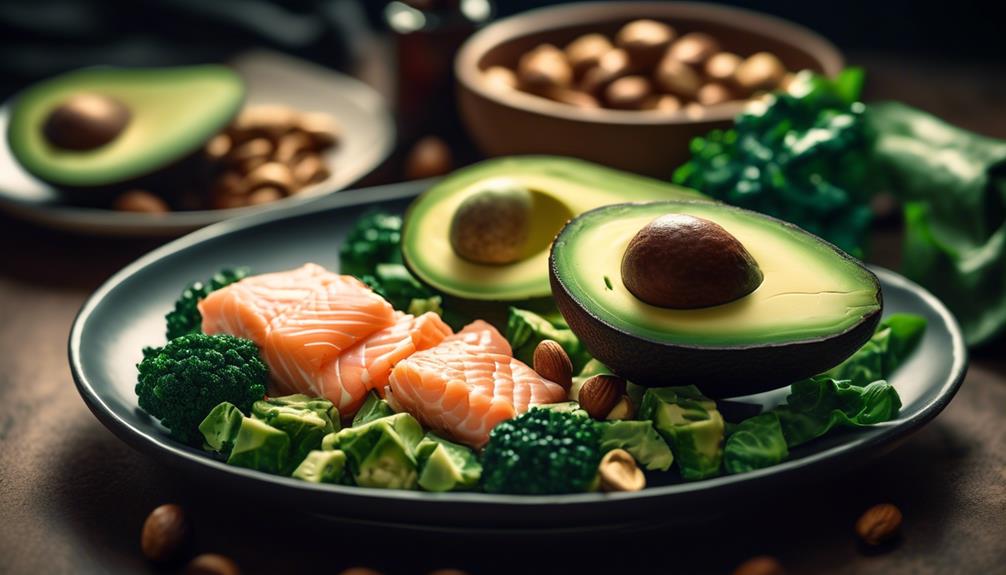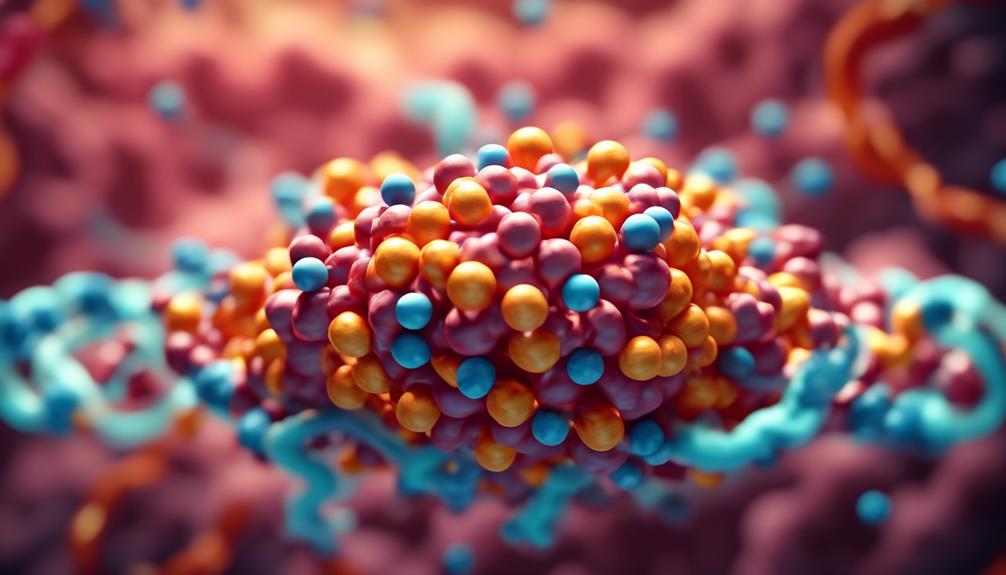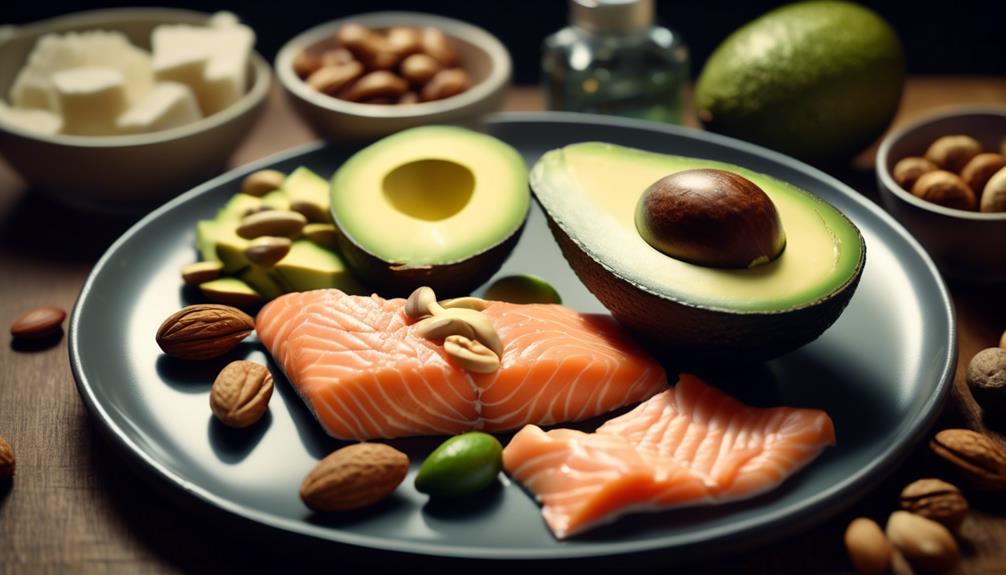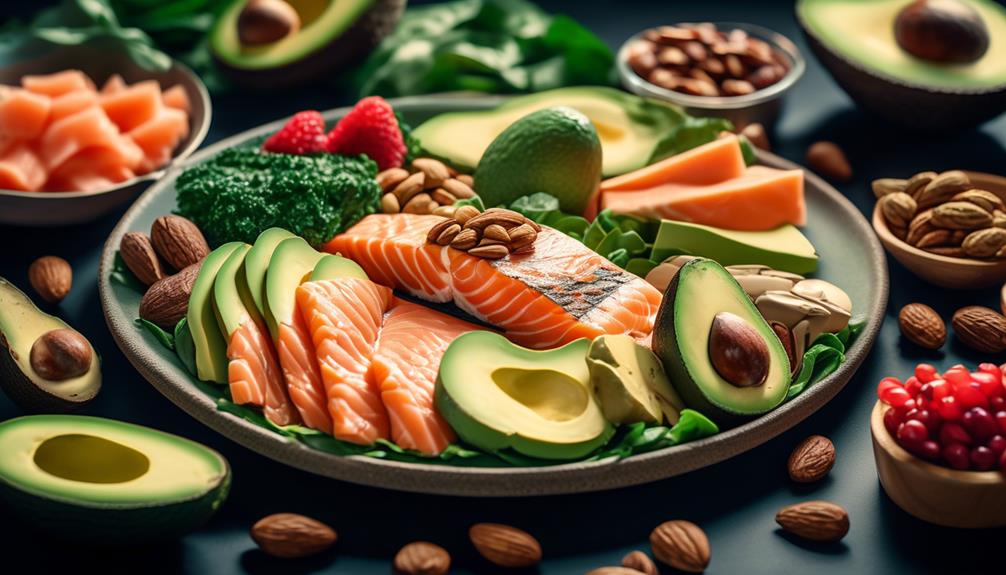Have you ever wondered how the popular keto diet could potentially affect your cholesterol levels? With its emphasis on high-fat foods and limited carbohydrate intake, the keto diet has gained significant attention.
But what does this mean for your cholesterol health? In this discussion, we will explore the impact of the keto diet on cholesterol levels, shedding light on both the potential benefits and risks involved.
So, let's dive into this intriguing topic and uncover the truth behind the relationship between the keto diet and cholesterol levels.
What Is the Keto Diet?

The keto diet, short for ketogenic diet, is a low-carb, high-fat diet that has gained popularity for its potential benefits in weight loss and improved health outcomes. Understanding ketosis is essential to comprehending how this diet works and its impact on overall health.
Ketosis is a metabolic state in which the body switches from using glucose as its primary fuel source to using ketones, which are produced from the breakdown of fats. By severely restricting carbohydrate intake and increasing fat consumption, the keto diet forces the body to enter into a state of ketosis.
During ketosis, the body becomes efficient at burning fat for fuel, leading to significant weight loss. Additionally, this diet has been shown to improve insulin sensitivity, reduce inflammation, and lower blood sugar levels, which can be beneficial for individuals with diabetes or prediabetes.
Some studies suggest that the keto diet may also have positive effects on heart health by increasing levels of HDL (good) cholesterol and reducing levels of LDL (bad) cholesterol. However, it's important to note that the long-term effects of the keto diet on cholesterol levels are still being researched, and individual results may vary.
How Does the Keto Diet Work?
The ketogenic diet works by inducing a metabolic state called ketosis, where the body primarily relies on ketones, generated from fat breakdown, as its main source of energy instead of glucose. This shift in fuel source leads to a reduction in insulin levels, increased fat burning, and ultimately weight loss.
While the diet has been shown to have positive effects on lipid profiles, including raising levels of HDL cholesterol (the 'good' cholesterol) and lowering levels of triglycerides, there are also potential risks and drawbacks to consider.
Mechanism of Ketosis
By inducing a state of ketosis, the keto diet alters your body's metabolic process to rely predominantly on fat for energy. Ketosis is a natural metabolic state where your body starts to break down stored fat into molecules called ketones, which are then used as fuel instead of glucose.
This occurs when you significantly reduce your carbohydrate intake and increase your consumption of fats. When you restrict carbohydrates, your body's glycogen stores become depleted, causing a drop in blood sugar levels. In response, your liver starts to convert fatty acids into ketones, which can be used by the brain and muscles for energy.
This shift from using glucose to ketones as the primary source of fuel has been associated with several benefits, including weight loss, improved insulin sensitivity, and increased mental clarity. The mechanism of ketosis plays a crucial role in these positive effects of the keto diet.
Impact on Lipid Profile
What impact does the keto diet have on your lipid profile and how does it work?
The keto diet, a high-fat, low-carbohydrate eating plan, has been found to have both positive and negative effects on lipid profile management and cardiovascular health. Here are some key points to consider:
- Increase in HDL cholesterol: The keto diet has been shown to increase levels of high-density lipoprotein (HDL) cholesterol, commonly known as 'good' cholesterol.
- Decrease in triglycerides: Studies have found that the keto diet can lead to a significant reduction in triglyceride levels, which are a risk factor for cardiovascular disease.
- Potential increase in LDL cholesterol: While the keto diet may increase levels of low-density lipoprotein (LDL) cholesterol, also known as 'bad' cholesterol, studies have shown that the LDL particles tend to become larger and less dense, which may be less harmful.
- Individual variation: It's important to note that the impact of the keto diet on lipid profile can vary from person to person, and it's recommended to monitor lipid levels regularly.
Potential Benefits and Risks
As we explore the potential benefits and risks of the keto diet, it's important to understand how this eating plan works and its impact on your overall health.
The keto diet is a low-carb, high-fat diet that aims to switch your body's primary source of fuel from carbohydrates to fat. By drastically reducing your carbohydrate intake, your body enters a state called ketosis, where it begins to burn fat for energy. This can lead to weight loss and improved insulin sensitivity.
However, it's important to note that the keto diet may also have potential long-term effects, particularly on cholesterol levels. Some studies suggest that the keto diet may lead to an increase in LDL cholesterol, which is often referred to as 'bad' cholesterol.
To manage cholesterol levels while following the keto diet, it's recommended to focus on consuming healthy fats, such as avocados and olive oil, and to limit intake of saturated and trans fats. Regular monitoring of cholesterol levels through blood tests is also advised.
Understanding Cholesterol Levels
To understand the impact of the keto diet on cholesterol levels, it's important to have a basic understanding of cholesterol.
Cholesterol is a waxy substance found in your blood that's necessary for the body to function properly.
The keto diet has been shown to affect cholesterol levels, so monitoring your cholesterol levels regularly is crucial to ensure any changes are within a healthy range.
Cholesterol Basics
Understanding cholesterol levels is essential for maintaining optimal health and preventing cardiovascular diseases. To effectively manage cholesterol, it's important to have a clear understanding of its basics. Here are some key points to consider:
- Cholesterol is a waxy substance produced by the liver and is also obtained from certain foods.
- There are two types of cholesterol: LDL (low-density lipoprotein) and HDL (high-density lipoprotein).
LDL cholesterol is often referred to as 'bad' cholesterol as it can build up in the arteries and increase the risk of heart disease. HDL cholesterol, on the other hand, is considered 'good' cholesterol as it helps remove LDL cholesterol from the bloodstream.
Regular cholesterol testing is crucial for monitoring your levels and making informed decisions about your health. By understanding cholesterol basics, you can take proactive steps towards maintaining healthy cholesterol levels and reducing the risk of cardiovascular diseases.
Impact of Keto
To explore the impact of the keto diet on cholesterol levels, it's important to analyze how this dietary approach influences the body's lipid profile. The keto diet is known for its ability to lower triglyceride levels and increase HDL (good) cholesterol levels. This is beneficial for heart health, as high triglyceride levels and low HDL cholesterol levels are associated with an increased risk of heart disease.
Additionally, the keto diet has been shown to improve insulin sensitivity and reduce inflammation, both of which are important factors in maintaining a healthy cardiovascular system. Some studies have also suggested that the keto diet may have a positive effect on blood pressure, although more research is needed to fully understand this relationship.
Monitoring Cholesterol Levels
Monitoring cholesterol levels is essential for maintaining optimal heart health and preventing the development of cardiovascular diseases. Regular cholesterol testing allows individuals to assess their cholesterol levels and make necessary adjustments to their diet and lifestyle.
Here are some key points to consider regarding cholesterol management and testing:
- Regular cholesterol testing: It's recommended to have your cholesterol levels checked regularly, especially if you have a family history of heart disease or other risk factors.
- LDL and HDL cholesterol: Monitoring both low-density lipoprotein (LDL) and high-density lipoprotein (HDL) cholesterol levels is crucial. High levels of LDL cholesterol increase the risk of heart disease, while high levels of HDL cholesterol are considered beneficial for heart health.
- Target levels: Knowing your target cholesterol levels can help you set goals for cholesterol management. Consult with your healthcare provider to determine what levels are appropriate for you.
- Lifestyle modifications: Monitoring cholesterol levels can help identify the need for lifestyle changes such as adopting a healthy diet, increasing physical activity, and quitting smoking, all of which can positively impact cholesterol levels.
The Relationship Between Diet and Cholesterol
Research consistently shows that the food you eat plays a crucial role in determining your cholesterol levels. The relationship between diet and heart disease has been extensively studied, and it's widely accepted that certain dietary choices can increase the risk of developing heart disease.
One specific diet that has gained popularity in recent years is the ketogenic diet, or keto diet for short. The impact of keto on heart health has been a subject of debate and research. The keto diet is a high-fat, low-carbohydrate diet that aims to shift the body into a state of ketosis, where it primarily burns fat for fuel instead of carbohydrates.
Proponents of the keto diet argue that it can lead to weight loss and improved overall health. However, some concerns have been raised about the potential effects of this diet on cholesterol levels. Studies have shown that the keto diet can indeed lead to changes in cholesterol levels.
In some individuals, the diet may cause an increase in LDL cholesterol, which is often referred to as 'bad' cholesterol. However, it's important to note that the increase in LDL cholesterol is often accompanied by an increase in HDL cholesterol, which is considered 'good' cholesterol. Additionally, the overall impact of these changes on heart health is still not fully understood.
Studies on the Impact of Keto Diet on Cholesterol Levels

Studies have been conducted to assess the impact of the keto diet on cholesterol levels.
One area of concern is the effect on LDL, or 'bad' cholesterol. Research suggests that while the keto diet may increase LDL levels, it also tends to increase HDL, or 'good' cholesterol, resulting in a favorable overall cholesterol profile.
Cholesterol Levels and Keto
Following a keto diet can have a significant impact on your cholesterol levels. Several studies have explored the relationship between the keto diet and heart health, specifically focusing on the impact of keto on HDL (high-density lipoprotein) levels. HDL is often referred to as the 'good' cholesterol, as it helps remove LDL (low-density lipoprotein) cholesterol from the bloodstream, reducing the risk of cardiovascular disease.
Research has shown that the keto diet can increase HDL levels, which can be beneficial for heart health. However, it's important to note that the overall effect of the keto diet on cholesterol levels may vary among individuals. It's recommended to consult with a healthcare professional before starting any new diet or making significant changes to your current diet.
Keto Diet and LDL
The impact of the keto diet on cholesterol levels, specifically LDL (low-density lipoprotein), has been widely studied. LDL is often referred to as the 'bad' cholesterol because high levels of it can increase the risk of heart disease. Studies have shown that the keto diet can have both positive and negative effects on LDL levels.
On one hand, the diet typically leads to a decrease in triglycerides and an increase in HDL (high-density lipoprotein), which is considered the 'good' cholesterol. However, some individuals may experience an increase in LDL levels while on the keto diet.
It's important to note that not all LDL cholesterol is created equal, and the size and density of LDL particles also play a role in determining cardiovascular risk. Future research is needed to fully understand the relationship between the keto diet and heart health, as well as its impact on overall cardiovascular risk.
Effects of the Keto Diet on LDL Cholesterol
Researchers have found that individuals who follow the keto diet may experience changes in their LDL cholesterol levels. LDL, or low-density lipoprotein, is often referred to as 'bad' cholesterol because high levels of it can increase the risk of cardiovascular diseases. The effects of the keto diet on LDL cholesterol have been a topic of interest, as it's crucial to understand how this popular dietary approach influences cardiovascular health.
Here are some key effects of the keto diet on LDL cholesterol:
- Increase in LDL cholesterol levels: Studies have shown that the keto diet can cause an increase in LDL cholesterol levels in some individuals. This increase is primarily due to the higher intake of saturated fats, which can lead to elevated LDL cholesterol levels.
- Changes in LDL particle size: The keto diet has been found to affect LDL particle size, with some evidence suggesting that it may lead to an increase in small, dense LDL particles. These smaller particles are considered to be more atherogenic, meaning they've a higher risk of contributing to the development of atherosclerosis.
- Individual variations: It's important to note that the effects of the keto diet on LDL cholesterol can vary from person to person. While some individuals may experience an increase in LDL cholesterol levels, others may not see any significant changes or even experience a decrease.
- Monitoring and individualized approach: Due to the potential impact of the keto diet on LDL cholesterol, individuals following this diet should regularly monitor their lipid profiles and consult with healthcare professionals. An individualized approach is essential to ensure that any potential negative effects on LDL cholesterol levels are appropriately managed.
It is crucial to consider these effects and monitor lipid profiles when following the keto diet, especially for individuals concerned about their cardiovascular health.
Effects of the Keto Diet on HDL Cholesterol

Individuals who closely monitor their cholesterol levels while following the keto diet may be interested in understanding the effects of this dietary approach on their HDL cholesterol.
HDL, or high-density lipoprotein, is often referred to as the 'good' cholesterol because it helps remove LDL, or low-density lipoprotein, from the bloodstream. Research suggests that the keto diet may have a positive impact on HDL cholesterol levels.
Several studies have shown that the keto diet can increase HDL cholesterol levels. A study published in the Journal of Nutrition and Metabolism found that individuals following a keto diet experienced a significant increase in HDL cholesterol levels compared to those on a low-fat diet. Another study published in the Annals of Internal Medicine showed similar results, with participants on a keto diet experiencing a significant increase in HDL cholesterol levels after only six months.
The impact of the keto diet on HDL cholesterol levels is likely due to the diet's high-fat content. The keto diet is low in carbohydrates and high in healthy fats, such as avocados, nuts, and olive oil. These fats can help raise HDL cholesterol levels and improve the overall lipid profile.
It is important to note that while the keto diet may increase HDL cholesterol levels, it can also increase LDL cholesterol levels in some individuals. Therefore, it's crucial to monitor cholesterol levels regularly and consult with a healthcare professional to ensure the diet is appropriate for individual health needs.
The Role of Triglycerides in Cholesterol Levels on Keto Diet
Understanding the impact of triglycerides on cholesterol levels while following the keto diet is crucial for individuals interested in maintaining a healthy lipid profile. Triglycerides are a type of fat found in the blood that provide energy to the body. However, elevated levels of triglycerides can contribute to an increased risk of heart disease.
The role of triglycerides in cholesterol metabolism is complex. When you consume a high-fat, low-carbohydrate diet like the keto diet, your body enters a state of ketosis, where it starts using stored fat as its primary source of energy. This can lead to a reduction in triglyceride levels in the blood.
Here are some key points to consider regarding the impact of the ketogenic diet on triglyceride levels:
- The keto diet is known to decrease triglyceride levels in many individuals, primarily due to the reduction in carbohydrate intake.
- Studies have shown that the keto diet can significantly lower triglyceride levels, especially in obese and overweight individuals.
- The decrease in triglycerides on the keto diet may be attributed to the increased consumption of healthy fats and the reduction in refined carbohydrates.
Maintaining a healthy balance of triglycerides is essential for overall heart health and can help improve your cholesterol profile.
Factors That Can Influence Cholesterol Levels on Keto Diet

When following the keto diet, various factors can influence your cholesterol levels. It's important to understand these factors in order to effectively manage your cholesterol levels while on the keto diet.
One of the main factors affecting keto cholesterol is the types of fats consumed. The keto diet emphasizes consuming high amounts of fat, but it's crucial to choose healthy fats such as avocados, nuts, and olive oil. These fats can help increase the levels of high-density lipoprotein (HDL) cholesterol, which is beneficial for heart health. On the other hand, consuming excessive amounts of unhealthy fats, such as saturated and trans fats found in processed foods and fried foods, can raise levels of low-density lipoprotein (LDL) cholesterol, which is associated with an increased risk of heart disease.
Another factor to consider is the overall quality of your diet. While on the keto diet, it's important to maintain a balanced intake of other nutrients such as fiber, vitamins, and minerals. A lack of these nutrients can negatively impact cholesterol levels.
Additionally, staying hydrated and incorporating regular physical activity into your routine can help manage cholesterol levels on the keto diet.
Tips for Monitoring Cholesterol Levels on Keto Diet
To effectively monitor your cholesterol levels on the keto diet, it's important to implement these key tips:
- Regularly check your cholesterol levels: Monitoring your cholesterol levels is crucial to understanding the impact of the keto diet on your lipid profile. Regular blood tests can provide valuable information about your cholesterol levels, including your total cholesterol, LDL cholesterol (often referred to as 'bad' cholesterol), HDL cholesterol (often referred to as 'good' cholesterol), and triglycerides. These tests can help you identify any changes and guide your dietary choices accordingly.
- Consult with a healthcare professional: It's essential to work closely with a healthcare professional, such as a registered dietitian or a doctor, who can provide guidance and monitor your cholesterol levels effectively. They can help interpret your test results, recommend adjustments to your diet if necessary, and ensure that you're on the right track to maintaining a healthy lipid profile.
- Focus on healthy fats: While the keto diet emphasizes consuming high amounts of fat, it's crucial to choose healthy fats to support heart health. Opt for sources like avocados, nuts, seeds, and olive oil, which are rich in monounsaturated fats and can have a positive impact on your lipid profile.
- Monitor overall health markers: Alongside monitoring your cholesterol levels, it's also important to keep an eye on other health markers, such as blood pressure, blood glucose levels, and weight. These markers can provide a comprehensive picture of your overall health and help identify any potential risks associated with the keto diet.
Potential Benefits of the Keto Diet on Cholesterol Levels

The keto diet has been shown to have potential benefits on cholesterol levels, according to research studies and scientific evidence. One of the main advantages of the keto diet is its positive impact on heart health. By reducing carbohydrate intake and increasing consumption of healthy fats, the keto diet can help manage cholesterol levels and improve overall cardiovascular health.
When you follow the keto diet, your body enters a state of ketosis, where it burns fat for fuel instead of carbohydrates. This process not only leads to weight loss but also has a positive effect on cholesterol levels. Studies have shown that the keto diet can increase levels of high-density lipoprotein (HDL) cholesterol, often referred to as 'good' cholesterol. Higher levels of HDL cholesterol are associated with a reduced risk of heart disease.
Additionally, the keto diet has been found to decrease levels of low-density lipoprotein (LDL) cholesterol, or 'bad' cholesterol. This is significant because high levels of LDL cholesterol are linked to an increased risk of heart disease. By reducing carb intake and incorporating healthy fats into your diet, the keto diet helps promote a healthier cholesterol profile.
However, it's important to note that the impact of the keto diet on cholesterol levels may vary from person to person. It's recommended to consult with a healthcare professional before starting any new diet or making significant changes to your eating habits. Regular monitoring of cholesterol levels is also crucial to ensure that the diet is having the desired effect on your heart health.
Potential Risks and Side Effects of the Keto Diet on Cholesterol Levels
While the keto diet has shown potential benefits for cholesterol levels, it's important to consider the potential risks and side effects associated with this dietary approach. It's crucial to be aware of these risks, especially if you have a history of high cholesterol or are concerned about your cardiovascular health.
Here are some potential risks and side effects of the keto diet on cholesterol levels:
- Increased levels of LDL cholesterol: The keto diet is often high in saturated fats, which can lead to an increase in low-density lipoprotein (LDL) cholesterol. High levels of LDL cholesterol are associated with an increased risk of heart disease.
- Imbalanced lipid profile: Following a keto diet may lead to an imbalanced lipid profile, with elevated levels of LDL cholesterol and reduced levels of high-density lipoprotein (HDL) cholesterol. This imbalance can further increase the risk of cardiovascular disease.
- Nutrient deficiencies: The keto diet restricts the intake of certain food groups, which can result in nutrient deficiencies. Inadequate intake of essential nutrients like fiber, vitamins, and minerals can negatively impact overall health, including cardiovascular health.
- Potential long-term effects: While short-term studies have shown positive effects on cholesterol levels, the long-term effects of the keto diet on cardiovascular health are still unclear. Further research is needed to understand the potential risks and benefits in the long run.
It is important to consult with a healthcare professional before starting any new diet, especially if you have pre-existing conditions or concerns about your cholesterol levels and cardiovascular health.
Conclusion: Balancing the Keto Diet and Cholesterol Health

Balancing cholesterol health while following the keto diet requires careful consideration and monitoring. While the keto diet has been shown to have positive effects on weight loss and certain health markers, it's important to manage cholesterol levels to ensure overall cardiovascular health.
To balance cholesterol levels while on the keto diet, it's recommended to focus on consuming healthy fats primarily from sources such as avocados, nuts, and olive oil. These fats are rich in monounsaturated and polyunsaturated fats, which have been shown to have a positive impact on cholesterol levels.
Additionally, incorporating more fiber-rich foods such as vegetables, legumes, and whole grains can help in managing cholesterol levels. Fiber binds to cholesterol in the digestive tract, preventing its absorption into the bloodstream.
Regular monitoring of cholesterol levels through blood tests is crucial to assess the impact of the keto diet on your cholesterol health. This will enable you to make any necessary adjustments to your diet or seek medical guidance if needed.
It is important to remember that individual responses to the keto diet may vary. While some individuals may experience an improvement in their cholesterol levels, others may see an increase. Therefore, maintaining a balanced and varied diet, along with regular exercise, is key to managing cholesterol health while on the keto diet.
Conclusion
In conclusion, while the keto diet has shown potential benefits for cholesterol levels, it's crucial to carefully monitor and balance cholesterol health. Studies have indicated both positive and negative effects of the diet on cholesterol levels.
Therefore, individuals considering the keto diet should consult with a healthcare professional to ensure proper monitoring and management of cholesterol levels.
Remember, a balanced approach to the keto diet is key for maintaining overall cholesterol health.







